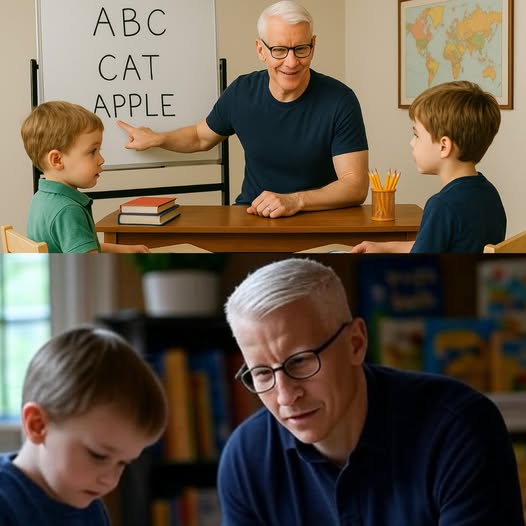The Class is Now in Session — With Wyatt as the Boss
What started as an ordinary afternoon quickly turned into a full-blown academic drama — with Wyatt, the eldest of the Cooper boys, taking charge in the most unexpected way. Dressed in a buttoned-up shirt and holding a ruler like a scepter, Wyatt transformed the family’s living room into a strict classroom, declaring himself “Teacher Wyatt.”
His students? None other than his younger brother Sebastian and their father, Anderson Cooper — a world-renowned journalist now downgraded to a pretend elementary student under the command of a seven-year-old with a passion for discipline.
“No Cookies for Troublemakers”
With a stern expression and a stack of blank paper as his lesson plan, Wyatt laid down the rules. His voice rang with authority as he walked the invisible aisles of the make-believe classroom.
“Anyone who doesn’t sit up straight will be banned from cookies tonight,” he announced.
And just like that, the power dynamics shifted.
Anderson, usually the one setting rules, found himself crossing his legs obediently on the carpet, while Sebastian — the ever-playful rebel — slumped dramatically in his seat, pretending to fall asleep mid-lecture.
Sebastian, the Class Clown
No classroom is complete without its troublemaker, and Sebastian was quick to embrace the role. As Wyatt turned to scribble on an imaginary chalkboard, Sebastian let out a loud snore and slouched sideways, eyes closed in exaggerated slumber.
“Sebastian!” Wyatt snapped, not breaking character for a second. “Sleeping in class? You want a warning or a cookie ban?”
Sebastian, eyes still shut, grinned and whispered, “I was meditating on the lesson, thầy ơi…”
The classroom giggled — Anderson included — but Teacher Wyatt was unmoved.
Anderson’s Oscar-Worthy Interruption
Not to be outdone in the theater of pretend, Anderson raised his hand like the earnest student he was assigned to be. Wyatt nodded reluctantly.
“Thưa thầy,” Anderson said with a straight face, “I don’t understand the lesson because the board is… invisible. You’re writing with a pretend pen.”
Wyatt paused. He stared at his dad, ruler held tightly at his side, then delivered his verdict without missing a beat.
“Em Anderson will receive an average conduct score this month.”
The room burst into laughter.
“Hạnh kiểm trung bình!” Wyatt repeated in Vietnamese for dramatic effect, clearly relishing the moment.
A Masterclass in Role-Reversal
For Anderson, who has spent a career asking tough questions and holding leaders accountable on national television, this was a rare chance to be on the receiving end of authority — and it came from a pint-sized educator in his own home.
There were no cameras, no teleprompters, and no script — just a dad playing along in a world crafted entirely by his children. And in this world, the rules were firm, the punishments involved dessert, and creativity was king.
The Power of Imaginative Play
Though the game was simple, the underlying magic was profound. Wyatt’s version of “school” wasn’t just about copying real-life education; it was his way of expressing leadership, humor, and responsibility. He mirrored the tone and phrases he’d heard from his real teachers, showing just how observant kids can be.
More importantly, it was a shared experience — a collaboration between parent and children where the lines between reality and fantasy blurred beautifully.
Parenting With Playfulness
Anderson’s willingness to dive into the scene — challenging his young “teacher,” pretending to be a confused student, even accepting a fake conduct report — showed a side of parenting often hidden behind routines and responsibilities.
He wasn’t just entertaining his kids. He was empowering them to take the lead, to create, and to be heard. In Wyatt’s imaginary school, every word mattered, every role was respected, and even make-believe misbehavior was met with consequences.
“Em Sebastian Will Clean the Board After Class”
Wyatt’s lesson didn’t stop at scolding. As the period continued, he added layers to his role.
“Sebastian, after class, you clean the board,” he said, pointing to an empty wall.
“But the board doesn’t exist!” Sebastian protested.
“Then it should be easy,” Wyatt replied with a smirk.
Even Anderson couldn’t argue with that logic.
No Homework, Just Laughter
By the end of the “school day,” the classroom floor was scattered with scribbled notes (most of them illegible), and the students were dismissed with a formal bow from Teacher Wyatt.
“There’s no homework today,” he announced. “But tomorrow, there’s a test on imagination.”
Sebastian cheered. Anderson groaned. “Can I at least get bonus points for creativity?”
Wyatt considered this seriously. “Only if you bring cookies for the whole class.”
Family Moments That Matter
The Cooper household, famous to the world through Anderson’s journalism, reveals another kind of headline within its walls — one of play, laughter, and role-switching games that give children the confidence to lead.
It wasn’t about grades, and it wasn’t about lessons in the traditional sense. It was about connection. About seeing the world through a child’s lens. About stepping out of the adult role, if only for a moment, to let your child teach you something.
Cookies Were Served Anyway
Despite the threat of bans and “average conduct” ratings, everyone got a cookie that evening. Even Anderson, who tried to argue that he’d earned two for “staying in character.”
Wyatt handed him one and said, “Next time, try not to talk back to the teacher.”
Anderson laughed, held up his cookie like a trophy, and nodded. “Yes, thầy.”
And for just a little longer, the classroom remained open — powered by love, laughter, and the wild imagination of a boy who just wanted to teach.






